7 Best DevOps Books That You Should Read (Spring 2023)
Running large companies is not an easy feat. It takes a lot of time, effort, and resources. This is especially true when it comes to software development. There are always new challenges and obstacles that need to be overcome. This is where DevOps comes in. DevOps is a set of practices that helps organizations automate and streamline their software development process. It enables them to deliver new features and updates faster and more efficiently.
If you’re looking to learn more about DevOps, we’ve put together a list of the 7 best DevOps books. These books will teach you everything you need to know about DevOps, from its history and principles to the latest tools and trends. Out of all the books we read, the DevOps Handbook became our favorite.
| Name | Nomination | Overall rating |
|
A comprehensive guide with case studies and great practices which is perfect for both newbies and experts in the sphere |
Editor’s Choice | 9.9 |
|
2. The Phoenix Project: A Novel about IT, DevOps, and Helping Your Business Win A novel for business leaders and IT managers with tips and tricks that won’t leave you bored
|
Best Novel for Business Leaders | 9.7 |
|
3. Accelerate: Building and Scaling High-Performing Technology Organizations Results of the research of State of DevOps reports with real-world examples and data to understand how organizations work |
Best Research with Data |
9.6 |
|
4. The Unicorn Project: A Novel About Developers, Digital Disruption, and Thriving in the Age of Data A follow-up book on the Phoenix Project from the developers’ perspective with practical pieces of advice |
Best Novel from Developers Perspective |
9.5 |
|
5. Continuous Delivery: Reliable Software Releases Through Build, Test, and Deployment Automation This guide provides organizations with the principles and technical practices needed to deliver software faster and more reliably |
Most Definitive Guide |
9.4 |
|
6. Leading the Transformation: Applying Agile and DevOps Principles at Scale A guide on everything from the basics of DevOps to more advanced concepts to deepen understanding of the subject |
Best For Applying Both DevOps and Agile |
9.3 |
|
7. The DevOps Adoption Playbook: A Guide to Adopting DevOps in a Multi-Speed IT Enterprise A guide for enerprises who want to implement DevOps, with actionable advice on overcoming typical challenges associated with large-scale DevOps adoption |
Best Guidelines for Large Companies |
9.2 |
Detailed Product Reviews
Features:
- Author: Gene Kim, Jez Humble, Patrick Debois, John Willis, John Allspaw
- Level of Proficiency: beginners
- Edition: 2nd edition (2021)
- Format(s): kindle, audiobook, paperback
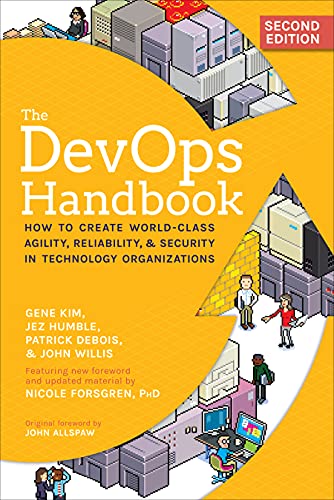
We rate the DevOps Handbook as our Editor’s Choice because it provides a detailed and understandable guide for anyone wanting to successfully execute a DevOps transformation. It gives an overview of the history of DevOps while also providing numerous case studies and best practices. You’ll be able to figure out how to bring together different teams that have different goals and get support from people in high places. The DevOps Handbook explains the three driving forces behind DevOps, known as The Three Ways: Flow, Feedback, and Continual Learning. This book uses relatable case studies to explore the Three Ways so that your organization can learn from high-performing companies and implement DevOps transformations.
Very few books come close to the DevOps Handbook in teaching leaders how to elevate work culture, increase profitability, and exceed productivity goals. It is a perfect option for anyone; technical or non-technical looking to scale their company and win in the marketplace as it perfectly blends technical jargon with business processes. The book has updated the information and released a new edition.
What we liked
- Provides more description on how to set up your DevOps organization.
- The perfect blend of technical jargon and business processes.
- Technical and non-technical audiences can derive value from the book.
- Contains enough use cases for the reader to detect characteristics of their own organization in at least one of them.
What could be better
- Content is repeated at times, which can be frustrating.
Features:
- Author: Gene Kim, Kevin Behr, George Spafford
- Level of Proficiency: beginners
- Edition: 5th (2018)
- Format(s): kindle, audiobook, hardcover, paperback
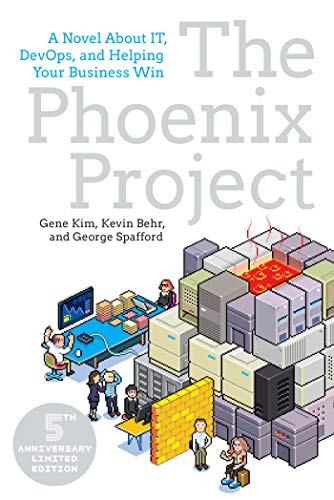
The Phoenix Project is a great read for business leaders and IT managers because it provides a real-world look at how to improve IT organizations. The book is full of helpful tips and tricks that can be used to streamline workflows, improve communication, and better serve other business functions. The story is also very entertaining and captivating, making it a great read for anyone who works in IT. Readers will not only learn how to improve their own IT organizations, they’ll never view IT the same way again. The book is written in a fast-paced style, and it does an excellent job of explaining the Three Ways of DevOps in a way that is easy to understand.
The Phoenix Project stacks up well against the DevOps Handbook above when it comes to giving business leaders the much needed knowledge on how to scale their businesses. They have a few concepts in common as the co-author of the Phoenix Project; Gene Kim also wrote the DevOps handbook. It is slightly pricier than the DevOps handbook though. All considered, the Phoenix project is an easier read because it has a lot of humor.
What we liked:
- This book is great for anyone who wants to understand the genesis of DevOps and the reasoning behind it.
- It uses real examples to showcase the problems that IT groups face and how to overcome these issues.
- The humor makes the book an enjoyable read, rather than a dry subject.
What could be better:
- This book likely won’t be of much help if you’re looking for a reference guide to put these thoughts into actual practice.
- The author’s use of profanity throughout the book can be off-putting for some readers.
Features:
- Author: Nicole Forsgren PhD, Jez Humble, Gene Kim
- Level of Proficiency: beginners
- Edition: 1st edition (2018)
- Format(s): kindle, audiobook, paperback
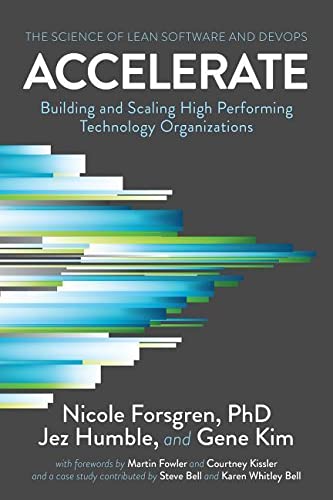
Accelerate is one of the best DevOps books because it presents the findings and science behind the research in an accessible way. The authors use rigorous statistical methods to analyze data collected from the State of DevOps reports, making the information accessible and easy to apply in any organization. In addition, the book includes a wealth of real-world examples and case studies that illustrate how these concepts can be put into practice. As a result, readers will gain a deep understanding of what drives high performance in software delivery teams and how to replicate those results in their own organizations.
Accelerate is another fantastic DevOps book for management at any level. Compared to other options like Phoenix Project and the DevOps Handbook, it is a better option for tips on how to measure software delivery performance. It is also a better option if you are new to DevOps because it explains in simple terms how to improve your app development processes.
What we liked:
- There are some great diagrams in the book that summarize the findings from a wide-ranging and long-lasting study.
- If you’re new to DevOps, then this book is perfect for you as It does an excellent job of explaining how it can help improve the speed and quality of your app development processes.
- The tips and advice included are also extremely actionable, so you can put what you learn into practice immediately.
What could be better:
- The findings in the book may be biased because the data is hidden and not open to public scrutiny.
Features:
- Author: Gene Kim
- Level of Proficiency: intermediate
- Edition: 1st (2019)
- Format(s): kindle, audiobook, hardcover, paperback
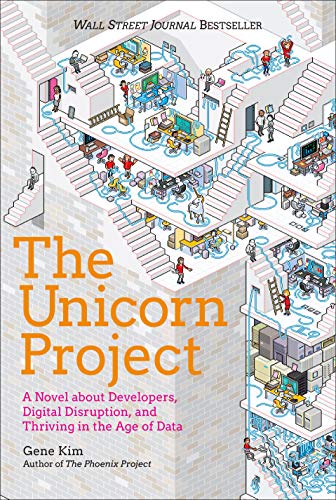
The Unicorn Project is the best novel from developers’ perspective because it tells the story of how a group of rebel developers overthrows an existing order to bring joy back to technology work. It also highlights the importance of collaboration between technology and business leaders in order to survive and thrive in a time of unprecedented uncertainty. Finally, the book provides a roadmap for how we can all create a better future together by embracing the principles of DevOps. If you’re looking for a book that will inspire you to fight for change in your organization, and provide practical advice on how to make it happen, then The Unicorn Project is a must-read.
The Unicorn Project is a highly acclaimed follow-up to the best-selling DevOps book, the Phoenix Project. Just like the Phoenix Project, the Unicorn project gives insights on how to improve a technology business but goes further into exploring and revealing the essential, yet invisible structures needed to make developers highly productive. It is a better option if you want something you can relate with as a developer.
- You feel like you’re part of the team while reading, as if you’re experiencing everything right alongside them.
- The book does a great job of providing both the technical and human aspects of DevOps.
- It’s an honest account that doesn’t shy away from the challenges faced by those who implement DevOps within their organizations.
What could be better:
- The book might be too technical for some readers, as it includes a lot of information about specific tools and processes.
- It’s not a step-by-step guide on how to implement DevOps within an organization.
Features:
- Author: Jez Humble, David Farley
- Level of Proficiency: intermediate
- Edition: 1st edition (2010)
- Format(s): kindle, paperback
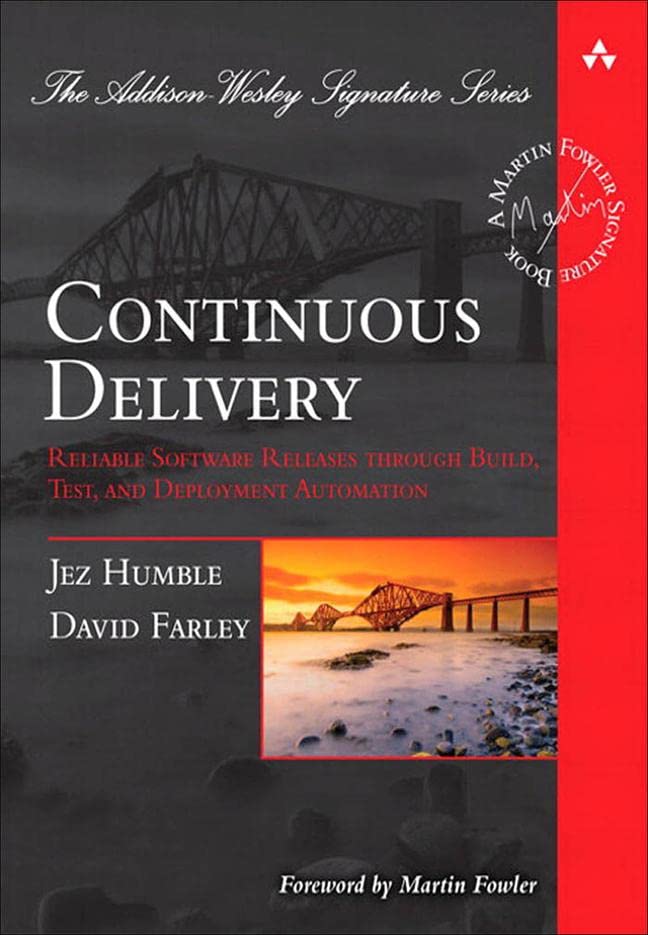
Continuous Delivery is the most definitive guide to DevOps. It is written by Jez Humble and David Farley, two of the leading experts on the topic. In the book, they introduce the principles and technical practices that enable organizations to deliver software faster and more reliably. They also discuss the “deployment pipeline,” an automated process for managing all changes, from check-in to release. Finally, they discuss the “ecosystem” needed to support continuous delivery, from infrastructure, data and configuration management to governance.
Continuous Delivery is the best DevOps book you can buy as a beginner. None of the books on this list come close to its detailed guide to DevOps. If you are already familiar with DevOps, you can also make the most out of this book as it covers both basics and more advanced concepts. Another thing that sets it apart from other options in this list is that you can read each chapter independently.
What we liked:
- It explains the process from end to end.
- You don’t need to read the book from start to finish – each chapter can be read independently depending on what interests you most.
- It covers a wide range of topics, from the basics of DevOps to more advanced concepts.
What could be better:
- The book contains a lot of information that is repeated several times throughout. This can make it difficult to follow along and grasp all of the material.
Features:
- Author: Tommy Mouser, Gary Gruver
- Level of Proficiency:
- Edition: illustrated (2015)
- Format(s): kindle, paperback, audiobook
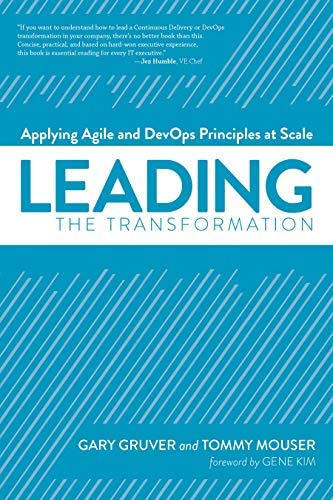
Leading the Transformation is perfect for those looking to apply both DevOps and Agile principles in order to deliver large software projects faster. The book provides a clear framework for improving the coordination of work across teams in large organizations, which is something that executives are uniquely positioned to lead. Additionally, the book contains valuable information on how to plan and execute a scaled-out Agile transformation, making it an essential read for anyone embarking on such a project.
Leading the Transformation is similar to Accelerate as they both insist on the importance of improving the coordination and effectiveness of teams in large organizations. However, unlike Accelerate and many other DevOps books that propagate the use of traditional agile and DevOps approaches, it targets the coordination of work across teams. If you can’t stand repetitive content, Accelerate is a better option.
What we liked:
- It is short and covers the issues well, making the point that leadership cannot manage by metrics without understanding technical issues at a high level.
- It provides practical advice on moving your development organization to a DevOps model, with a focus on major integrated products and firmware.
- It has a great case study of HP, which has both server software and embedded software.
What could be better:
- The content is very repetitive.
Features:
- Author: Sanjeev Sharma
- Level of Proficiency: beginners
- Edition: 1st edition (2017)
- Format(s): kindle, paperback
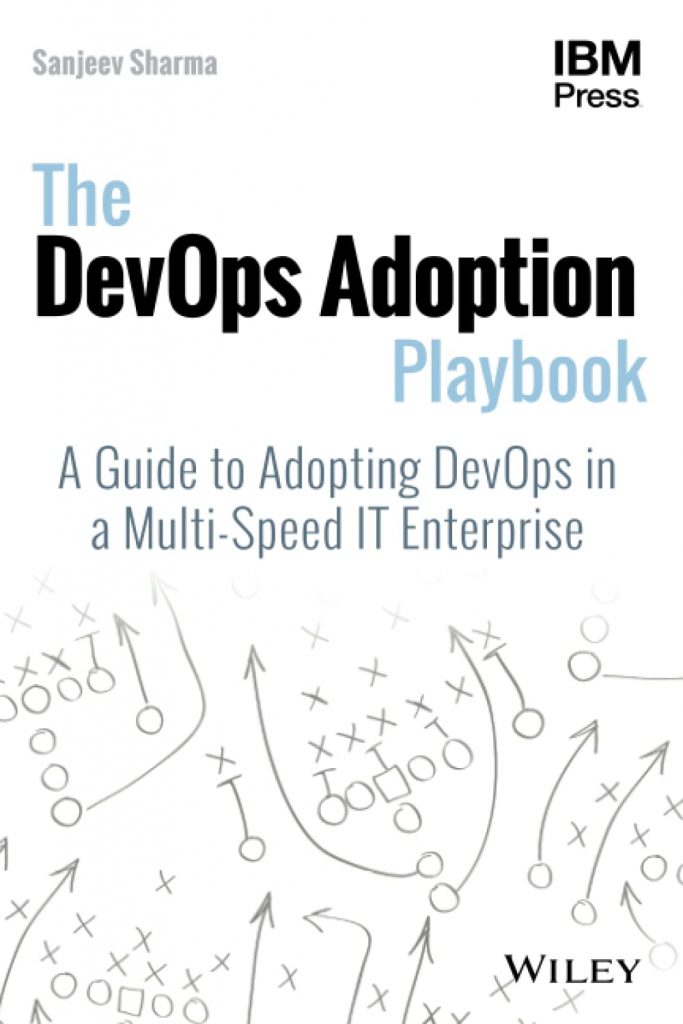
The DevOps Adoption Playbook is the best guide for large companies wanting to implement DevOps due to its focus on enterprise-level needs. The book provides actionable advice on how to overcome typical challenges associated with large-scale DevOps adoption, such as organizational and cultural changes necessary for success. In addition, the book covers essential topics such as selecting the right automation tools and practices for your organization. Implementing DevOps at scale requires careful planning and execution, and The DevOps Adoption Playbook will give you the insights you need to make your transformation a success.
The DevOps Adoption Playbook is another fantastic beginner-friendly option in this list. It is more concise than most books in this list, yet super informative. Like the Phoenix Project, it is written with a lot of humor to captivate a diverse audience. It is a better option for any DevOps beginner looking for insights on implementing DevOps at big organizations.
What we liked:
- The book was written so that a diverse audience could easily understand it.
- This text is easy to read, concise and yet still informative.
- The author writes with humor and incorporates many customer stories and analogies, often from the world of sports, to explain a variety of concepts.
What could be better:
- The text is closely spaced together and consists mostly of bullet points, similar to those found in a Powerpoint presentation.
Buying Guide
When looking for the best DevOps books, there are a few things you should keep in mind like the publisher, the year of publication, whether it is an updated version, and so on. However, the most important factor to consider is the content itself. The book should be able to give you an overview of DevOps and its principles so that you can apply them in real-world scenarios. It should also contain detailed explanations of the different concepts so that you can understand them completely.
What is DevOps?
DevOps is a set of practices that combines software development (Dev) and information-technology operations (Ops) to shorten the systems-development life cycle while delivering features, fixes, and updates frequently in close alignment with business objectives.
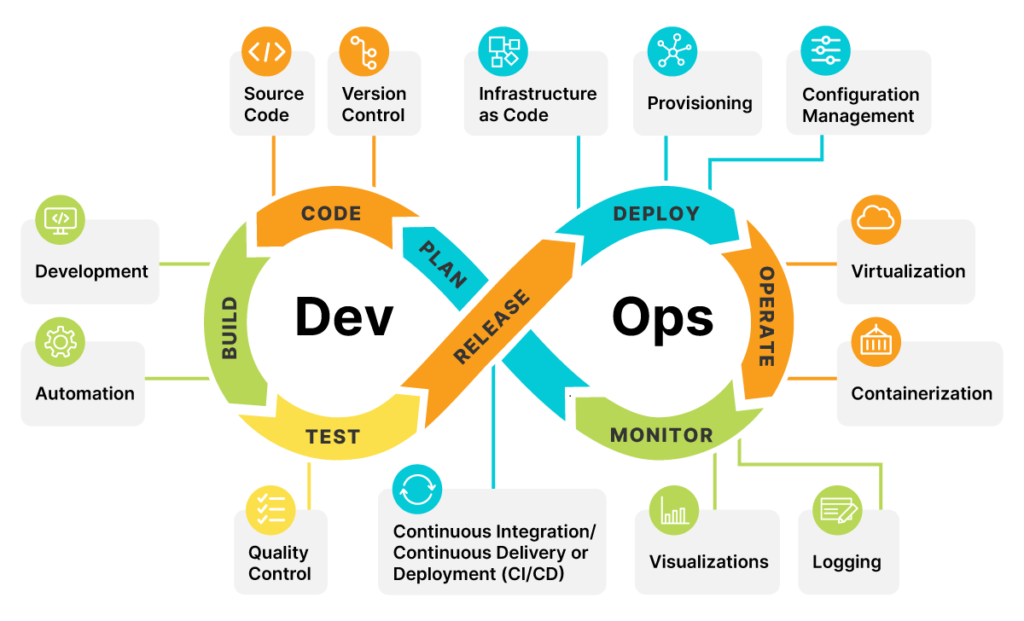
Why DevOps?
There are many reasons why an organization would want to implement DevOps, but the most common ones are:
To increase the speed of delivery: In a traditional software development process, there can be a lot of bottlenecks that slow down the delivery of new features or updates. By using DevOps practices, these bottlenecks can be removed, and the speed of delivery can be increased.
To improve stability and quality: In a traditional software development process, there is often a trade-off between speed and quality. DevOps practices can help you to have both speed and quality by automating many of the tasks that are traditionally done manually.
To reduce costs: In a traditional software development process, there can be a lot of waste due to inefficient processes. DevOps practices can help to reduce these costs by automating tasks and by making it easier to reuse resources.
Level of Expertise
When choosing a DevOps book, you should also consider your level of expertise.
- Beginners: If you are new to DevOps, it is best to start with a book that covers the basics and gradually moves on to more advanced topics.
- Intermediate: If you have some experience with DevOps, you can choose a book that covers more advanced topics like continuous delivery or configuration management.
- Advanced: If you are an expert in DevOps, you can choose a book that covers more specialized topics like security or monitoring.
Things to Look for in the Best DevOps Books
The Year of Publication and New Editions
Another thing to consider is the year of publication and whether the book has been updated recently. While older books can still be relevant with a solid foundation in DevOps concepts, they might not have the latest information on DevOps tools and practices. On the other hand, newer books might not have been battle-tested yet. So, it is best to find a balance between these two factors.
New editions of books are also released regularly to keep up with the latest trends and changes in the field of DevOps. So, it is best to check if the book you are considering is the latest edition.
Authors
The authors of the book also play an important role in determining its quality. Make sure to check the credentials of the author and see if they are experts in the field of DevOps.
Some of the best DevOps books are written by people who have years of experience in the field and have implemented DevOps concepts in large organizations.
For instance, Gene Kim who wrote at least four of the books on this list is a well-known author in the DevOps community and has implemented DevOps at multiple organizations.
FAQ
What is the best way to learn DevOps?
The best way to learn DevOps is to get started with a basic understanding of the concepts and then gradually move on to more advanced topics.
Can I learn DevOps in 3 months?
While it is possible to learn DevOps in 3 months, it is best to have at least 6 months to 1 year of experience before trying to implement DevOps concepts.
Is DevOps only for developers?
No, DevOps is not only for developers. It is for everyone who is involved in the software development process, from project managers to testers.
Our Verdict
The DevOps Handbook made it to the top of our list of best books on DevOps as it presents a comprehensive guide that is also enjoyable to read. The book’s co-authors, Gene Kim, Jez Humble, and Patrick Debois, are DevOps thought leaders who have contributed immensely to the movement.
Next, our second pick and one of the best DevOps books written in a novel format is the Phoenix Project. This book does an excellent job of bringing the concepts of DevOps to life through a story that is both engaging and informative.
And finally, Accelerate rounds out our top three of the best DevOps books. As we mentioned, this book provides insights based on the authors’ research that is both rigorous and easy to understand. The case studies and real-world examples are also incredibly valuable in helping readers see how these concepts can be put into practice.
References
https://aws.amazon.com/devops/what-is-devops/
https://cloud.google.com/devops
